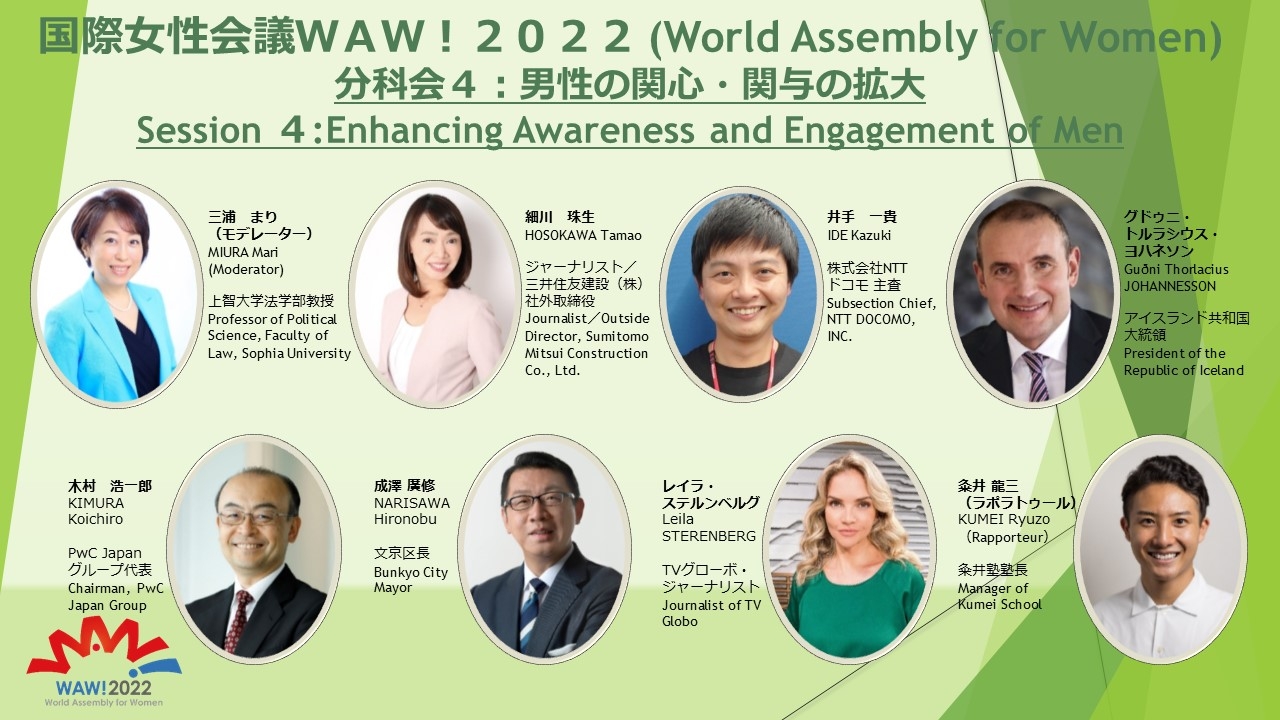Women's Empowerment and Gender Equality
World Assembly for Women: WAW! 2022
Concept Note
Enhancing Awareness and Engagement of Men
Participants

- MIURA Mari, Professor of Political Science, Faculty of Law, Sophia University (Moderator)
- HOSOKAWA Tamao, Journalist/ Outside Director, Sumitomo Mitsui Construction Co. Ltd.
- IDE Kazuki, Subsection Chief, NTT Docomo, Inc.
- Guðni Thorlacius JOHANNESSON, President of the Republic of Iceland
- KIMURA Koichiro, Chairman, PwC Japan Group
- NARISAWA Hironobu, Bunkyo City Mayor
- Leila STERENBERG, Journalist of TV Globo
- KUMEI Ryuzo, Manager of Kumei School (Rapporteur)
Current situation and challenges to be discussed
In order to realize gender equality, it is necessary to emancipate ourselves from the gender stereotypes and the way of thinking "because I am a man, because I am a woman, this is how I should be" and to rethink how to assume responsibility in society for both genders. Cooperation from men is also essential for women's empowerment. Hence, women are beginning to work with men to create new norms on gender roles. For example, in 2014, the United Nations launched the "HeForShe Movement," which aims to promote all people, including men, to act for change in order to achieve gender equality. Japan's former Prime Minister Abe became a HeForShe Champion, which later Prime Minister Kishida has followed.
While working from home and other flexible work styles have been largely accepted in the COVID-19 situation, the burden of women's unpaid care work has increased. As dual income households become more common and family norms and values change, there is a limit to what women can do in terms of care work in addition to paid work, such as childcare and nursing care; creating the need for burden sharing. On the other hand, it is difficult for men to take on some of these burdens while the traditional image of men is maintained, and it makes it unrealistic for them to take on housework, childcare, and nursing care on top of the short time they spend at home due to overtime work. Forcing men to sleep less will lead to lower productivity and even cause physical and mental health problems.
Considering gender equality could be an opportunity to review the way we have worked, how society works as well as the impact of norms, and to rethink work styles of all people and the evaluation system in our society, which would lead to our efforts to create a society where everyone can live more happily. To this end, it is necessary for men to get involved in efforts toward gender equality.
At the WAW! 2022, we will further discuss what kind of environment needs to be created to increase men's awareness and engagement in efforts toward gender equality, and what kind of evaluation methods are appropriate to create a society where everyone can live easily.
Discussion Topics
- What efforts are necessary at the national, local, and private levels to break down gender stereotypes?
- Japan is characterized by (1) extremely long hours of paid work, especially for men, (2) an extremely strong tendency for women to be disproportionately involved in unpaid work, and (3) the total number of hours worked by both men and women, paid and unpaid, is long and they are already "working" to the limit in terms of time. What solutions are available to resolve these challenges?
- What are good practices of men's active involvement in gender equality efforts in government, workplace, community, family, etc.? What are the obstacles of enhancing men’s awareness and engagement in these efforts and what kind of enabling environment we should create?
- What kind of ways of living, work styles, and evaluation methods are possible in order to create a society where everyone can live easily?


 .
.